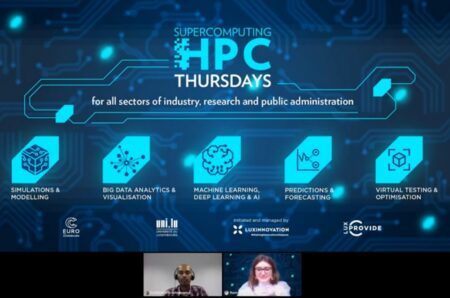 The first three webinars focused on high performance computing (HPC) as a driver of innovation, the architecture of a supercomputer and the value of HPC-driven simulations.
The first three webinars focused on high performance computing (HPC) as a driver of innovation, the architecture of a supercomputer and the value of HPC-driven simulations.
The national Luxembourg supercomputer, MeluXina, is one of the most powerful in Europe. It is particularly designed to meet business needs.
The National Competence Centre in HPC is organising these HPC Thursdays webinars to show concrete examples of supercomputing applications in different fields and inspire potential users to consider working with the HPC to boost their innovation activities.
1st session: HPC benefits
HPC as an enabler of innovation and a driver of significant financial return for businesses: this was the topic of the first webinar. Although there is not one single metric that can be used across all sectors to measures the benefits of HPC, it is clear that it can benefit companies of all types and sizes in all sectors.
The reasons for using supercomputing tend to be individual for each organisation and related to its strategic priorities.
While HPC is already today driving business and research competitiveness, its importance will increase exponentially in the future as the amount of data available doubles every two years.
There is a great potential for incorporating the exploitation of data into the business models of many companies. The Luxembourg HPC is modular and can be adapted to different company needs.
2nd session: supercomputer architecture
Having some basic knowledge of how high performance computers work obviously makes it easier to plan and prepare projects.
The second webinar therefore introduced the architecture of supercomputers. It covered everything from CPUs (processors of roughly the same family as those that can be found in an ordinary laptop or PC) to accelerators such as graphical cards, also called GPUs, and a more exotica card type called FPGA, and memory capacities.
Various types of software that can be installed on supercomputers means that their use does not necessarily require knowledge of programming languages. Nevertheless, having some knowledge of parallel programming is always an advantage.
The speaker shared some basic information about software packages available on supercomputers, and about how to choose the appropriate programming language or programming model.
However, a key starting point for successful HPC projects is a clear understanding of the problem that is to be addressed (in the fields of physics, biology, finance, mechanics, data analysis, etc.) as well as a rough estimation of the needs in terms of computing resources. A good first step is running some trial-and-error jobs on an ordinary computer as a way to estimate how many nodes and how much memory, wall time (the time needed to run an application), etc. would be needed.
3rd session: Supercomputing simulation
The third webinar focused on business and research benefits of supercomputing simulation at scale. Digital simulations are used in many fields, such as biology, seismic processing, climate and rendering. There are several reasons why HPC-enabled at-scale simulations are useful:
- They quickly produce results and improve the time to market or solution
- The make it possible to tackle larger problems by moving at a larger scale and increasing accuracy, granularity and resolution
- They help save costs in terms of money, time and manpower
There are also problems that just cannot be solved properly or correctly without using a supercomputer.
The webinar also showcased concrete results obtained with supercomputers, and in particular with MeluXina. The examples ranged from industry (e.g. digital twins) to sustainability (carbon emission reductions, for example) to the simulation of a flock of birds, employed in biological transformation (i.e. the application of the materials, structures and principles of living nature to technology and management in order to achieve sustainable value creation).
